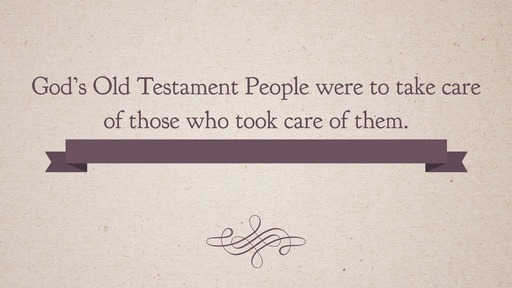Taking Care of Those Who Take Care of You

Notes
Transcript
I heard about a deacon in a church who often prayed for the pastor: Lord you keep him humble, we will keep him poor.
From time to, as I have preached the whole counsel of God, book by book and chapter by chapter through the Bible, I come to passages like the one we will study today.
It is a little uncomfortable for me, because I know that it may be seen as self-serving. However, it is good to see what the Bible says about “Taking Care of Those Who Take Care of You”.
God’s Old Testament People were to take care of those who took care of them.
God’s Old Testament People were to take care of those who took care of them.
1 “The Levitical priests, the whole tribe of Levi, will have no portion or inheritance with Israel. They will eat the Lord’s fire offerings; that is their inheritance.
2 Although Levi has no inheritance among his brothers, the Lord is his inheritance, as He promised him.
3 This is the priests’ share from the people who offer a sacrifice, whether it is an ox, a sheep, or a goat; the priests are to be given the shoulder, jaws, and stomach.
4 You are to give him the firstfruits of your grain, new wine, and oil, and the first sheared wool of your flock.
5 For Yahweh your God has chosen him and his sons from all your tribes to stand and minister in His name from now on.
6 When a Levite leaves one of your towns where he lives in Israel and wants to go to the place the Lord chooses,
7 he may serve in the name of Yahweh his God like all his fellow Levites who minister there in the presence of the Lord.
8 They will eat equal portions besides what he has received from the sale of the family estate.
God’s New Testament People are to take care of those who take care of them
God’s New Testament People are to take care of those who take care of them
3 My defense to those who examine me is this:
4 Don’t we have the right to eat and drink?
5 Don’t we have the right to be accompanied by a Christian wife like the other apostles, the Lord’s brothers, and Cephas?
6 Or do Barnabas and I alone have no right to refrain from working?
7 Who ever goes to war at his own expense? Who plants a vineyard and does not eat its fruit? Or who shepherds a flock and does not drink the milk from the flock?
8 Am I saying this from a human perspective? Doesn’t the law also say the same thing?
9 For it is written in the law of Moses, Do not muzzle an ox while it treads out grain. Is God really concerned with oxen?
10 Or isn’t He really saying it for us? Yes, this is written for us, because he who plows ought to plow in hope, and he who threshes should do so in hope of sharing the crop.
11 If we have sown spiritual things for you, is it too much if we reap material benefits from you?
12 If others have this right to receive benefits from you, don’t we even more? However, we have not made use of this right; instead we endure everything so that we will not hinder the gospel of Christ.
13 Don’t you know that those who perform the temple services eat the food from the temple, and those who serve at the altar share in the offerings of the altar?
14 In the same way, the Lord has commanded that those who preach the gospel should earn their living by the gospel.
Paul did not take money from the Corinthians. God met his needs in two other ways. 1. He worked as a tent-maker, and 2. He received support from other churches in other areas. But in the passage Paul makes it clear that the was descriptive and prescriptive. In other words, this was Paul’s practice in a certain place in a certain time, but was not normative for other pastors in other places. His emphasis in the passage is all about taking care of those who take care of you.
He makes several illustrations.
A soldier doesn’t pay his way to serve. verse 7
A vine keeper eats the grapes verse 7
A shepherd drinks milk from the herd. verse 7
An ox eats while it treads the corn verse 9 (appealing to Deuteronomy 25.4)
A priest eats what is left in the temple 13
He asks a summary question assuming a yes answer. verse 11
He makes a summary statement. Verse 14
Two things to carry away.
A good pastor should give of themselves full-bore, and go the extra mile, especially when it comes to prayer and the Word of God.
A good church should be sure that their pastors are taken care of while they take care of the flock.
17 The elders who are good leaders should be considered worthy of an ample honorarium, especially those who work hard at preaching and teaching.
